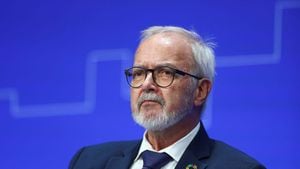Recently, the political stage has been set ablaze with the announcement of President-elect Donald Trump's decision to appoint Robert F. Kennedy Jr. as the Secretary of Health and Human Services (HHS). This nomination has stirred significant debate, especially considering Kennedy's history as one of the most prominent vaccine skeptics in America. His vocal opposition to vaccines—most infamously the completely debunked and discredited claim linking the measles, mumps, and rubella (MMR) vaccine to autism—has placed him at odds with many medical professionals and health organizations.
This tension around Kennedy’s nomination could not be more pronounced. His dismissal of established medical evidence, particularly around vaccinations, has alarmed public health experts who worry about his potential influence on vaccination rates across the country. During his career, Kennedy has insisted he is not anti-vaccine but has continuously advocated for more extensive studies on vaccine safety and efficacy. Vaccine researchers have noted with concern the effect his leadership could have on parents who are already hesitant about vaccinations, potentially persuading them to reject recommended immunizations.
Dr. Peter Hotez, co-director of the Texas Children’s Hospital Center for Vaccine Development, expressed worry on how Kennedy’s confirmation as HHS Secretary could turn the tide against vaccine acceptance, stating, "I don't see how these things improve any. If anything, they could start to decline even farther with someone like Robert F. Kennedy Jr. at the top of HHS. I worry about the erosion of the number of kids getting vaccinated." This concern is echoed by Dr. Paul Offit, director of the Vaccine Education Center, who argues against labeling Kennedy as merely skeptical of vaccines, branding him instead as someone who often spreads misinformation about their safety.
Against the backdrop of rising vaccine-preventable disease outbreaks, fears are mounting about what Kennedy's leadership might mean for public health. The Centers for Disease Control and Prevention (CDC) has reported significant increases in measles and whooping cough cases, alarming health officials. With approximately 96% of measles cases reported this year occurring among unvaccinated individuals, experts are sounding the alarm about the potential public health crisis if vaccinations continue to decline.
Interestingly, Kennedy's skepticism transcends vaccines; he has called for broader scrutiny of food safety, environmental regulations, and pharmaceutical practices. His campaign slogan, "Make America Healthy Again," reflects his intention to shake up the existing health care paradigm and tackle what he describes as pervasive corruption within federal agencies like the Food and Drug Administration (FDA) and the National Institutes of Health (NIH). Kennedy has hinted at cleaning house within HHS if confirmed, declaring, "Preserve your records, and pack your bags," emphasizing his intent to overhaul the existing bureaucratic structure.
Critically, Kennedy aims to take on what he perceives as the negative impacts of the industrial food complex and the pharmaceutical industry on public health. He articulated these concerns during his campaign, which sought to address chronic diseases along with advocating for alternative healthcare solutions. This has raised eyebrows among political commentators, as some worry his unconventional methods and beliefs could significantly alter policies traditionally based on scientific consensus.
Despite the uproar, there are those who see opportunity amid the chaos of Kennedy’s nomination. Former Wisconsin Governor Tommy Thompson voiced his belief in the potential for reform under Kennedy, citing the need for new ideas to address the chronic disease epidemic plaguing America. Thompson stated, “I think anytime you want to shake up a department, you’ve got to give them credit for wanting to do it.” Meanwhile, comedian Bill Maher regarded Kennedy's role as somewhat liberatory, noting, "The system as it is... is already messed up. It could always be worse, but perhaps this is the shake-up we need to address the existing issues."
The debate continues, with significant divisions evident among the Republican party as well. Some party members question Kennedy’s controversial stance on vaccines and his past statements, with Senate Republicans issuing cautious remarks about his potential for confirmation. Veteran political insiders suggest his unorthodox methods and ideas could clash with traditional Republican values, complicuating his approval process.
Should he gain Senate confirmation, RFK Jr. would oversee an agency with about 80,000 employees and manage vast budgets and programs affecting millions of Americans. The HHS plays an enormous role, overseeing everything from Medicare and Medicaid to the FDA and CDC, with responsibilities stretching from addressing chronic illnesses to responding to pandemics.
While many expect resistance to Kennedy’s confirmation, the possibility of recess appointments by Trump looms as another area of concern, with insiders indicating this could ignite marathon Senate sessions to fight against his appointment. It is clear the current political climate faces substantial changes if Kennedy oversees federal health policy moving forward.
At its core, Kennedy’s nomination not only marks a tumultuous chapter in American health policy but also raises pivotal questions about the future of public health initiatives and the extent to which personal beliefs can shape government health strategies. The outcome will undoubtedly influence the dialogue around vaccines, treatments for chronic diseases, and public trust between the government and healthcare institutions over the coming years.
What remains indisputable is the wave of change sparked by RFK Jr. and the conversations ignited by his nomination. Experts, activists, and citizens alike will be watching closely as the Senate deliberates not just on Kennedy's confirmation, but on the ideological battle it may represent for the direction of healthcare and public trust across the United States.



